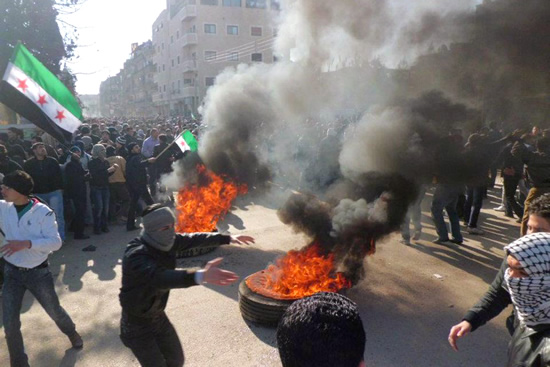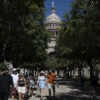
Demonstrations and funeral in Douma, near Damascus, Syria on February 4, 2012, after one of the deadliest days in more than 10 months of troubles in the country. Photo by ABACAPRESS.COM
To hide its myriad of other crimes, the Syrian government is determined to prevent news of its atrocities against its own citizens from getting out.
Journalists claim that this week they were deliberately targeted by troops loyal to Syrian President Bashar al-Assad, and they have released videos pleading for help. On Wednesday, Sunday Times correspondent Marie Colvin and award-winning French photographer Remi Ochlik died in the besieged city of Homs when artillery shells and rockets rained down on their makeshift media center. British photographer Paul Conroy, who works for The Sunday Times, was wounded in the artillery strike and is shown in a video lying on a makeshift bed of blankets in a windowless room.
The Daily Signal depends on the support of readers like you. Donate now
Covering the news in the Middle East is a very high-risk endeavor. According to the Committee to Protect Journalists, 19 died last year while covering the Arab uprisings.
Syria has for decades been among the most closed of the Middle East autocracies and has a history of repressing any information about internal massacres of its own people. In 1982, the Syrian government brutally quashed an uprising in the town of Hama, Syria’s fourth-largest city and this year again a scene of protests against the government. Entire sections of the city were reduced to rubble, and at least 10,000 people (some estimates are as high was 25,000) were brutally murdered. It was the greatest carnage inflicted by the Syrian government on its own population in modern times. At the time, very little news of the massacre reached the international community, and international reporters struggled to cover the event from the distance of Beirut, with little more than hearsay to go by.
Thousands of Syrians have lost their lives over the 11 months of the Syrian uprising. Yet thanks in part to the courage of journalists determined tell the story, and in part to new technology, Syrians have been able to connect with the rest of the world and plead their case. Syrians are using innovative ways of logging onto the Internet in a high-stakes cat-and-mouse game, even when the Syrian government shuts down its servers.
But activists who work to get video and information out via the Internet are extremely vulnerable. According to the Committee to Protect Journalists, Syrians using Facebook to smuggle video footage to reporters across the world were consequently tracked by the Syrian Electronic Army, a government-sponsored hacking group, and tortured by government authorities.
The Syrian government has turned the Internet into another battleground—and it has learned from the experience of other Middle Eastern regimes. Sophisticated Web surveillance of the anti-government movement has led to arrests, while pro-government hackers use the Internet to attack activists and their causes. An army of young, tech-savvy Syrians is waging a more sophisticated pro-regime effort, flooding Facebook, news sites, and Web pages. The Internet has become almost as dangerous as protesting on the street, according to Syrian activists. After being arrested and often tortured, activists are forced to stay online for intelligence gathering by the Syrian Security Service.
The United States and other concerned nations meeting in Tunis today should demand not only that Syria stops massacring own people, allowing international aid to flow to the wounded, but also that the Assad regime cease its persecution of journalists and online activists. They desperately need and deserve our support.































